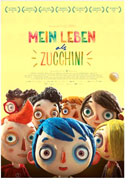

Opening 16 Feb 2017
Directed by:
Claude Barras
Writing credits:
Gilles Paris, Céline Sciamma, Germano Zullo, Claude Barras, Morgan Navarro
Principal actors:
Gaspard Schlatter, Sixtine Murat, Paulin Jaccoud, Michel Vuillermoz, Raul Ribera
This stop-motion animated film tells the story of Zucchini, a nine-year old boy who goes to live in a group home for children after his mother dies. Her accidental death is inadvertently Zucchini’s fault: he pushes her down a flight of stairs as she stumbles towards him, drunk – as usual – screaming that she’s going to beat him. When Zucchini goes to the police station, a kind police officer takes pity on the boy, who hasn’t seen his father in years, and gently guides him through the system.
It’s a rocky start for Zucchini at the home, where Simon, the group’s bully, initially gives him a hard time. But once the two boys – and the rest of the children – connect over the myriad terrible and sad reasons they’re all there (from deportation of a parent to abuse to suicide and murder), they form a bond as a group that gives them strength to deal with feeling abandoned or unloved. This spirit of being together against the untrustworthy adult world is cemented when Camille, a new orphan, arrives at the home. Zucchini is immediately smitten with the reserved girl, who has witnessed a heinous crime that the movie candidly addresses. He and the other children team up to help rescue Camille’s from a cruel aunt who only wants custody of the child for the money it comes with.
If this all sounds very heavy – especially for an animated film – well, it is. But it’s also beautiful and moving, silly and, at times, laugh-out-loud funny. (This is especially true of a scene in which the boys discuss sex, in appropriately childish and hilarious terms.) My Life as a Zucchini is a mature, melancholy tale that succeeds because it never sugar-coats what can happen in terrible situations that, unfortunately, many children the world over find themselves in. It is direct and respects older children’s need for honesty, and it shows how resilient children can be. Each of the children in the home has their own problems and reasons to distrust adults, but luckily the staff at the home is loving and genuinely cares for them. And there is a happy ending for Zucchini and Camille, who find love in the home of a trusted adult.
The movie’s treatment of Zucchini’s story is so thoughtful and sophisticated that it is a pleasure to watch as an adult. Despite being an animated film, however, this is not intended – nor appropriate in my opinion – for young children. I’d think this is most appropriate for kids nine years and older, or those who are mature enough to understand the content, and parents prepared to have serious conversations with their kids afterwards. Based on the novel by Gilles Paris. (Diana Schnelle)